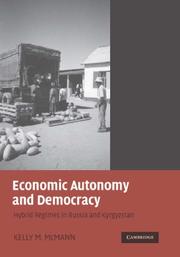| Listing 1 - 1 of 1 |
Sort by
|

ISBN: 9781107407121 0521857619 9780521857611 9780511510281 9780511221293 0511221290 0511220006 9780511220005 9780511219320 0511219326 0511220529 9780511220524 0511510284 9786610480425 6610480427 0511219326 1107166802 1280480424 0511316313 1107407125 Year: 2006 Publisher: New York Cambridge [UK] Cambridge University Press
Abstract | Keywords | Export | Availability | Bookmark
 Loading...
Loading...Choose an application
- Reference Manager
- EndNote
- RefWorks (Direct export to RefWorks)
How do individuals decide to exercise their democratic rights? This book argues that they first assess their economic autonomy, meaning their ability to make a living independent of government authorities. Before individuals consider whether their resources and organizational abilities are adequate to act on their interests, they calculate the risk of political activism to their livelihood. This is particularly evident in regions of the world where states monopolize the economy and thus can readily harass activists at their workplaces. Economic autonomy links capitalism and democracy through individuals' calculations about activism. Accounts of activists' decisions about establishing independent media, leading political organizations, and running for office and descriptions of government harassment in Russia and Kyrgyzstan, along with examples from most regions of the world, illustrate these arguments. Economic autonomy and the interaction among democratic rights help explain the global proliferation of hybrid regimes, governments that display both democratic and authoritarian characteristics.
ECONOMIC CONDITIONS -- 323 --- POLITICS AND GOVERNMENT -- 323 --- DEMOCRACY -- 323 --- Kyrgyzstan --- Democracy --- Political participation --- Russia (Federation) --- Economic conditions --- Politics and government --- #SBIB:328H263 --- Citizen participation --- Community action --- Community involvement --- Community participation --- Involvement, Community --- Mass political behavior --- Participation, Citizen --- Participation, Community --- Participation, Political --- Political activity --- Political behavior --- Political rights --- Social participation --- Political activists --- Politics, Practical --- Self-government --- Political science --- Equality --- Representative government and representation --- Republics --- Instellingen en beleid: andere GOS-staten --- Social Sciences --- Political Science
| Listing 1 - 1 of 1 |
Sort by
|

 Search
Search Feedback
Feedback About UniCat
About UniCat  Help
Help News
News